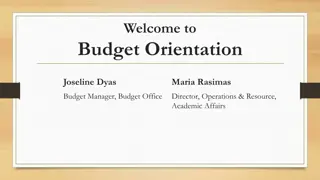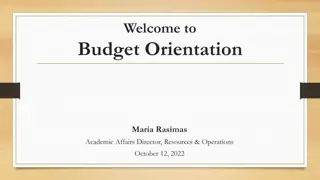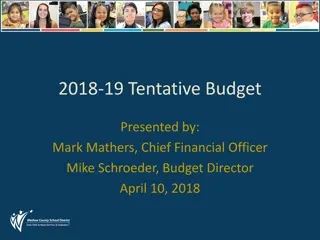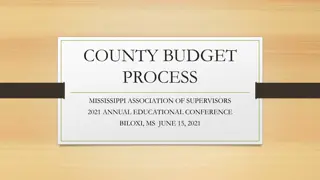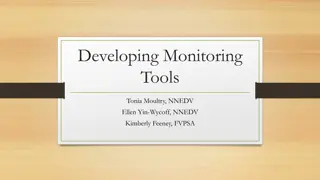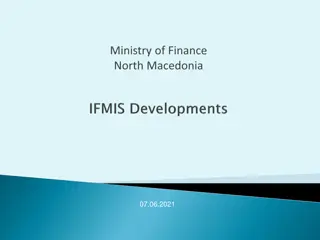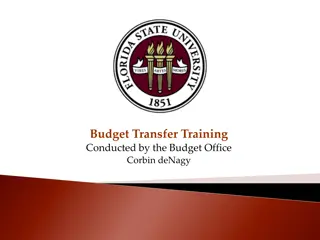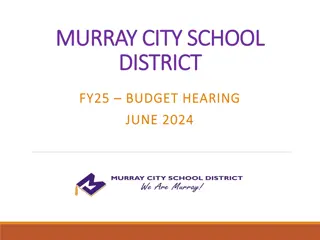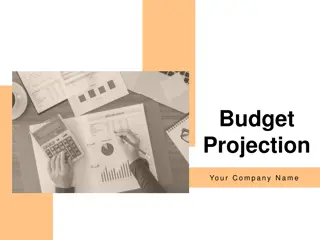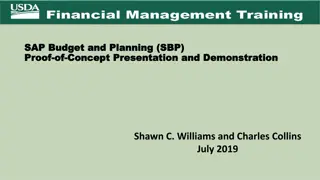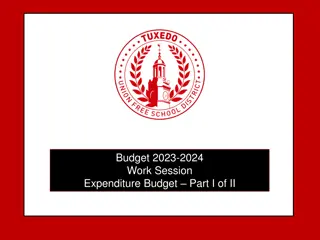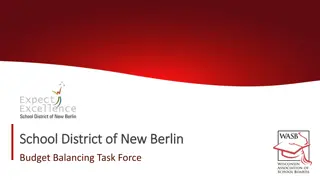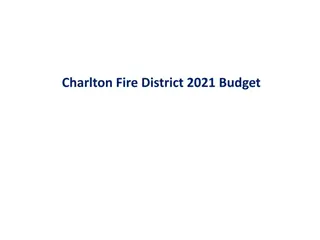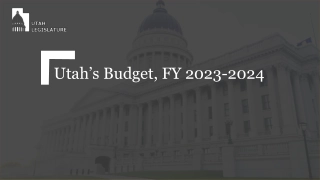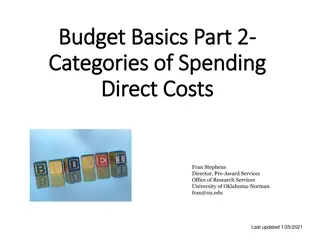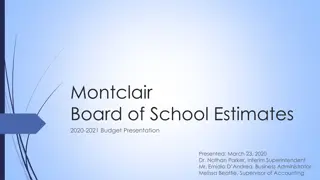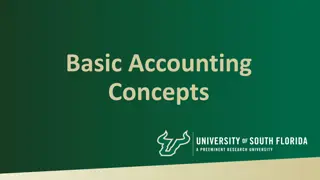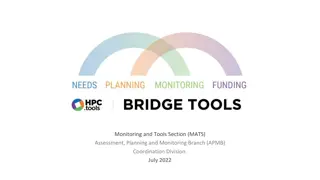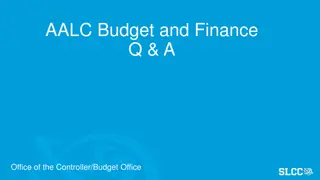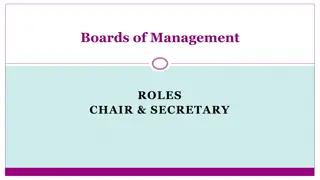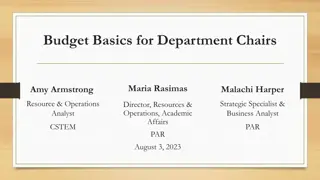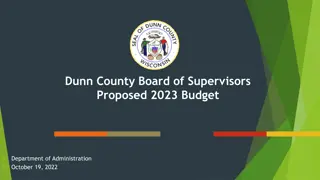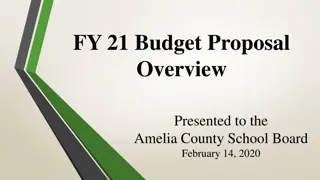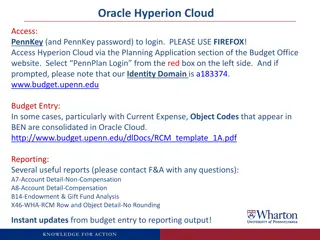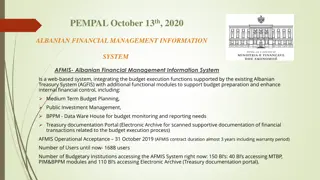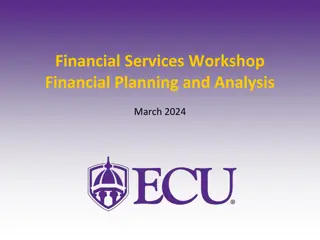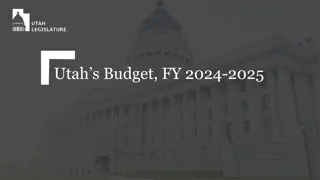School Budget Management: Responsibilities, Planning, and Monitoring
Governors play a vital role in overseeing school budgets, ensuring value for money, and financial planning. They need to achieve efficiency, effectiveness, and economy in spending to benefit students. Financial planning, including the School Improvement Plan and Budget Plan, forms the basis for allocating resources and monitoring progress. Realistic budgets help in preventing financial crises and directing resources to areas of need. Ensuring funds are spent wisely for educational purposes is crucial for the school's success.
Download Presentation

Please find below an Image/Link to download the presentation.
The content on the website is provided AS IS for your information and personal use only. It may not be sold, licensed, or shared on other websites without obtaining consent from the author. Download presentation by click this link. If you encounter any issues during the download, it is possible that the publisher has removed the file from their server.
E N D
Presentation Transcript
Setting and Monitoring the School Budget January 2022 Shirley Chin & Paula Field
COURSE OUTLINE Governors Responsibilities Value for Money Financial Planning Preparing the Budget Managing and Monitoring the Budget Financial Benchmarking Case Study
Governors Responsibilities The Governing Body are accountable for the standards of education provided and for balancing cost and effectiveness The Governing Body, supported by information and advice provided by the Headteacher, decides the strategic direction of the school Each governing body has a statutory responsibility for the financial management of the delegated budget in their school. The Governing Body should ensure funds are spent for the educational purpose of the pupils and the school
Value for Money Governors need to ensure they achieve value for money Achieving the best possible outcomes for pupils in the most efficient way by considering the 3E s
Value for Money the 3 Es Economy Efficiency Effectiveness
Financial Planning Why is it important ? It provides a school with a clear view of how it intends to use its resources Consists of 2 inter-related elements ; The School Improvement Plan The Budget Plan
School Improvement Plan Forms a major building block for constructing the budget Identifies Educational Priorities Strong focus on raising standards Progress of initiatives are monitored Clear link established between priorities and spending plans
The Budget Plan Sets out how resources are allocated Provides a mechanism for in year monitoring The concrete expression of the School plan Allows staff and governors to see how spending will help achieve targets
Realistic Budgets 4 types of Benefit Financial - Lowers risk of financial crisis Educational - Allocates resources to areas of need and development Motivational Image - Better external image for a school well managed financially
Planning the Budget Receipt of final allocations 28 Feb Budget plan to start on 1 Apr Formula Income Staffing costs 75 to 80% Premises and ICT 10 to 12%
Setting the Budget Budgeting is not just a matter of balancing the books Uncertainties about future funding 3 year planning
3 Years and Beyond Provides indicative budgets for future years Allows for more strategic decision making Identifies possible issues well in advance Access Education Budgets
Case Study In July, a school highlights the need for an additional NQT Cost for Sept March year 1 16,856 Cost for year 2 30,185 Cost for year 3 32,602 Cost for year 4 35,198 Cost for year 5 38,030 Therefore full cost over 5 year period 152,871
Case Study Review
Presentation of Budget Approval by GB clear to aid transparency CFR format Linkage between school improvement plan and budget
Budget Planning Cycle April-Start of financial year-close down of old year April-May final budget plan- surplus/deficit from previous year c/f June-July Initial monitoring Q1 Sept-Oct revise budgets Q2 Nov-Dec review budget plans Jan-Feb Q3 monitoring begin work on budget plans, 29/2 final budget allocations March begin to finalise budget plans prepare for year end
BUDGET MANAGEMENT & MONITORING
Why Budget Monitoring and Reporting is Important? Good budget management tracking where the money has come from and where it has gone. Identifies additional income / shortfalls Identifies unexpected expenditure (over spends) / missed actuals (under spends) Identifies saving
Why Budget Monitoring and Reporting is Important? Assess cost effectiveness of individual initiatives against the criteria set out in the school improvement plan Early identification of need for remedial action or revised spending decisions in light of budget position Understanding of budget position important for setting following year s budget(s)
Finance Reporting Aims To present Governors with good quality financial information on current and forecast income and expenditure Comparison of actual expenditure against budget provision Early warning system
See attached School Finance Governors pack
What should the governors pack include Finance report School cfr report LA I &E Report Reconciliation of school system to local authority Revenue budget Monitoring Budget monitoring summary statement Capital Local Authority income and expenditure capital report
Budget Management - Summary Effective budget monitoring reports provide vital information about spending patterns that help make realistic forecasts of year-end under or overspends To make in year decisions on significant budget to actual variances Enables school to react to changes in the SIP with virements
Amending Financial Plans Points to remember: Levels of virement delegated to Headteachers or finance committee New plan must also be reported to the Governing Body Local system updated Copy of plan forwarded to LMS Team LA General Ledger updated and Summary Report now matches school system Retain a copy of the original budget for future financial planning
Monitoring Roles LMS Finance Team overview of all schools Governors Strategic overview Headteachers Day to day responsibility Departmental Budget Holders specific budget headings e.g. curriculum depts, premises
Financial Benchmarking Joint venture between DfE and Ofsted Collection of data on every school nationwide using CFR returns Can be accessed by any school - https://www.education.gov.uk/sfb/ School Financial Value Standards Form - dashboard tab also shows additional benchmarking data
Financial Benchmarking Benchmarking your expenditure will help to: Focus on planning and managing your budget; Identify areas for improvement; Set targets for improvement; Achieve value for money quality vs cost
Case study Exercise 1 Budget Setting
Case study Exercise 2 Budget Monitoring
LMS Finance Team Rustum Setna Principal Accountant Schools 546089 Kim George Senior Schools Financial Advisor 548076 Lynne Knapton Schools Financial Advisor 548074 Jaspreet Raju Schools Financial advisor 546086 Shirley Chin Schools Financial Advisor 546095 Paula Field Schools Financial Advisor 546083 Naeem Mahmud Assistant Accountant 546081 Email LMS@Luton.gov.uk



